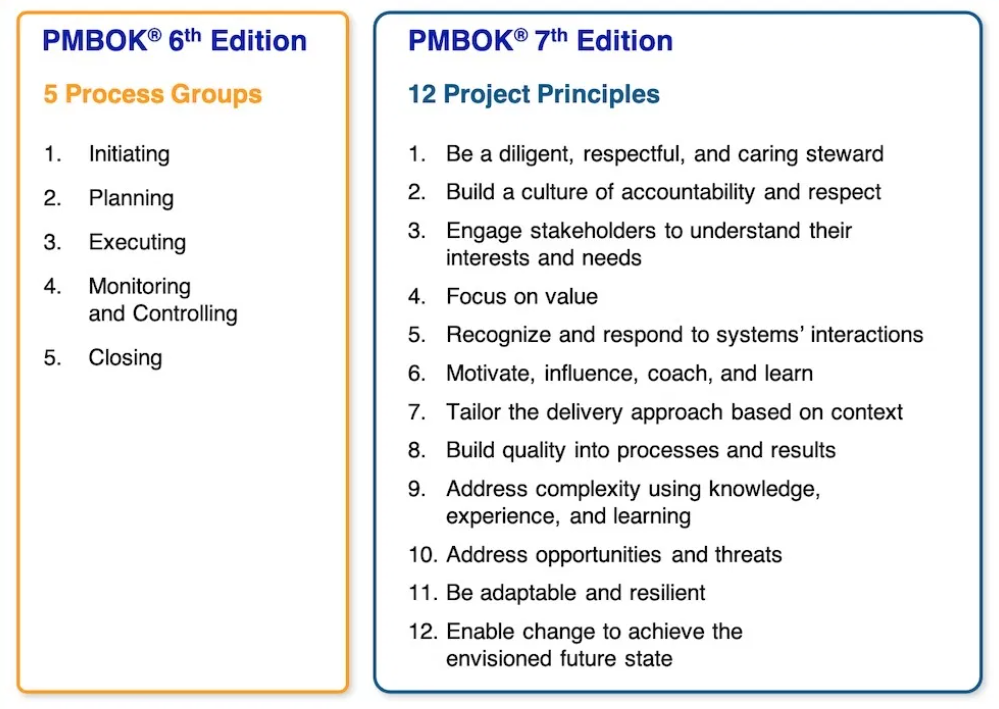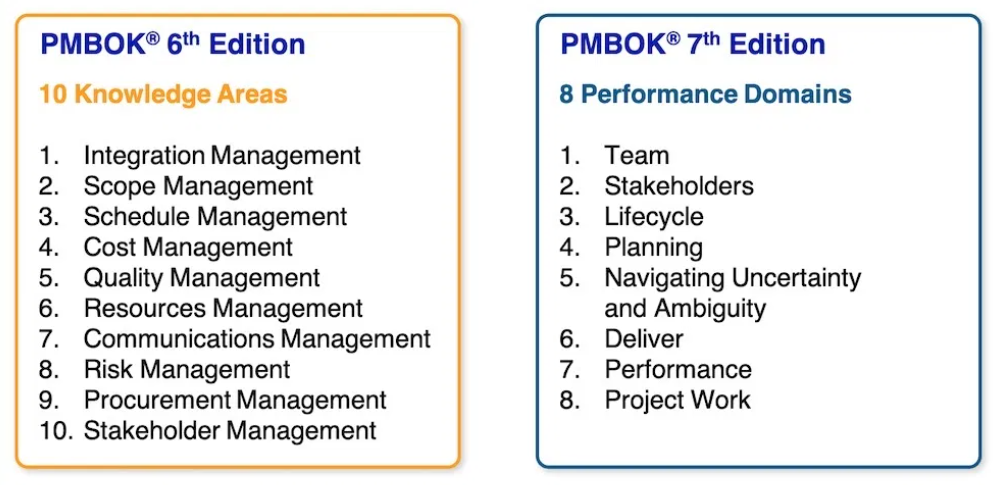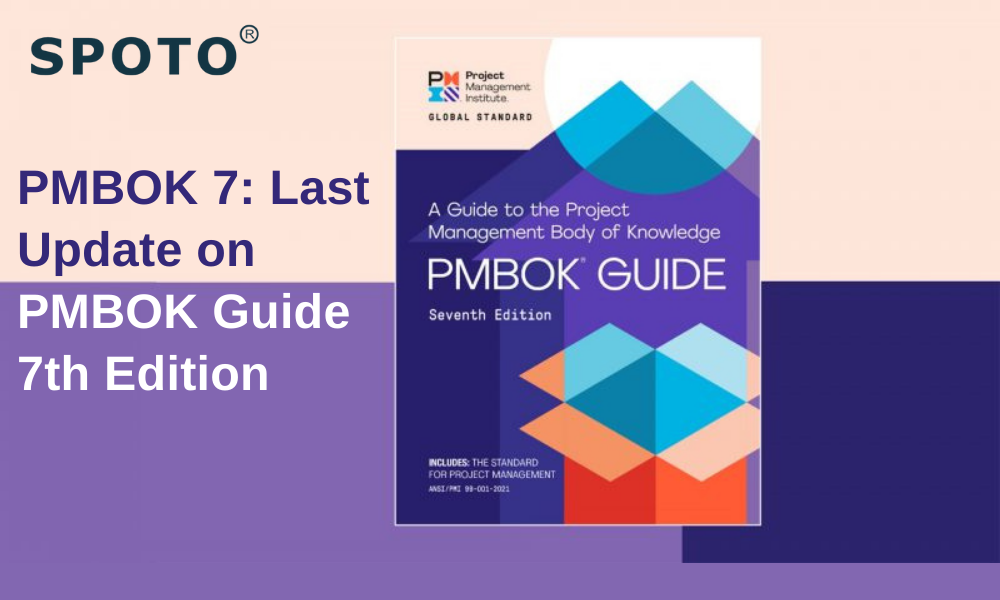Many occupations, including project management, have altered as a result of technological advancements. There was space to improve the content and organization of the manual based on comments from project managers across industries and around the world. Practitioners are now responsible for determining the optimal delivery approach (predictive, adaptive, or hybrid) to complete the work and deliver value. PMI recognized that the PMBOK® Guide needed to be updated to remain current and satisfy the needs of our clients.
Related Read: PMBOK® 7th Edition: What You Need to Know!
The Publication of PMBOK 7
Member download and eBook purchase for the English version of the PMBOK® Guide – Seventh Edition is now available! Translations will be released in August 2021.
Do you want to download the free PMBOK 7th? Join our PMP Study Group to access the PMBOK® Guide – Seventh Edition Now!
Here’s a final sneak peek at what we can expect.
The Project Management Body of Knowledge’s Purpose
The PMBOK Guide, or Project Management Body of Knowledge, is divided into two sections:
The Project Management Standard
PMBOK 7 will include PMI’s Standard for Project Management, much as previous PMBOK Guides. The American National Standards Institute (ANSI) will certify this. PMI has stated that it will continue to be affiliated with the ISO and ANSI standards bodies.
A Guide to the PMBOK
A collection of what PMI deems to be the essential body of knowledge that all project managers should be familiar with. It has served as the foundation for the Project Management Professional (PMP) and Certified Associate in Project Management (CAPM) until now. I believe it will become more of a framework for applying the standard in the future, with a wide range of knowledge stored in PMI’s new online repository, PMI standards+.
The authors of the 7th Edition aspire to establish a truly adaptive approach to project management that includes Predictive, Agile and Hybrid approaches. To accomplish this, they’ve had to start from scratch. The only things from the 6th Edition they maintained were a few key definitions! Regardless of the approach you choose, the new guide will contain knowledge and ideas that are relevant.
The following are the five significant changes we will discuss in this article:
- Processes will be replaced by principles
- Performance Domains will take the role of Knowledge Areas
- Tailoring will have its own section
- Models, Methods, and Artifacts will be introduced in PMBOK 7
- A complete part will be dedicated to the Value Delivery System
Do you possess the skills required for a project manager’s position? Self-assessment using the Free Practice Exam Questions.
PMBOK 7 Is Based on Principles
Organizations like PMI can document their standards using one of three general approaches:
Storytelling and description are used in narrative-based standards. This is the least rigorous.
Process-based standards document some processes that bring the intended results together.
Principle-based standards are based on a set of core principle declarations. They’re designed to capture and summarize widely agreed-upon methods to best practice in critical areas.
The process-based approach is evident in PMBOK 6 and previous editions. The Seventh Edition, on the other hand, will establish a Principle-based standard. Below is the comparison of the 6th and 7th Editions of the PMBOK Guide.

Knowledge Areas Will Be Replaced by Performance Domains: Alignment with Other PMI Standards
Another significant change will be abandoning the ten Knowledge Areas, which have served as the foundation for the PMI’s body of knowledge since its inception. Below is the comparison of the 6th and 7th Editions of the PMBOK Guide.

Standards Plus
Standards Plus is a knowledge base available online. The webpage was recently launched by PMI. It also has a good collection of high-quality knowledge to be a significant knowledge resource for Project managers – at all stages of your study.
It appears to have the following advantages:
- knowledge resources’ breadth and depth
- content creators’ and writers’ authority
- Accessible, bite-sized bits of particular topic information
Its unstructured nature appears to be its shortcoming as a learning resource.
If the content from PMBOK 6th still relevant does not find a place in PMBOK 7th, it will be archived here. You should be able to locate all of the ITTOs and much of the Knowledge Area content here, among other things.
Tailoring Will Have Its Own Section
The purposeful adaption of your entire Project Management approach to the situation is known as tailoring. Finally, PMI will provide us with some clear guidelines, which were missing in PMBOK 6th.
Project managers must consider the following factors while deciding on a strategy:
- The type of project leads to the extensive choice of a predictive, agile, or hybrid approach.
- The nature of the organization influences governance and assurance decisions.
- The project’s specifics enable us to optimize processes and tool selections.
PMI already has a beneficial extract in the form of a simple explanatory diagram that you should download.
Models, Methods, and Artifacts
In PMBOK 7, a section will be included that specifies standard models, methods, and artifacts that project practitioners can use. Each model, method, or artifact will be described briefly. It will then map them to one or more of the project performance domains in which the authors believe it will be most appropriate or helpful.
The Value Delivery System: PMBOK 7’s Most Welcome Change
The Value Delivery System is a comprehensive framework for delivering company value through projects. The PMBOK is based on the 7th Edition of the Standard for Project Management, demonstrating how effective strategy leads to the targeted business value in an organization.
What’s the Relationship between PMP, CAPM, and PMBOK7?
First and foremost, nothing will change soon. PMBOK6, which is required for both the PMP and CAPM exams, will be available through the end of the year at the very least. As a result, you should proceed with your plans.
And don’t think for a second that the new PMBOK guide will invalidate or diminish the value (or validity) of your current certification.
Let’s look at PMP and CAPM one by one.
PMBOK 7 and PMP
The PMBOK Guide is not, and never has been, the PMP exam syllabus. That’s the Content Outline for the Exam.
PMBOK 6 will continue to be a valuable resource for the PMP exam. When the PMI revises the PMP exam (which will most likely be published in 2023), PMBOK 7 will be used as a source of information in constructing the syllabus.
PMBOK 7 and CAPM
The CAPM exam is now based on PMBOK 6. When the PMI will update the CAPM test is unknown. When it does, it will almost certainly use the 7th Edition as a primary source.
Final Thoughts
Even though the PMI has issued PMBOK 7, PMBOK 6 will continue to be a valuable resource for the PMP exam. If you’ve already studied the PMBOK6 for the PMP exam, schedule your exam and complete it as soon as possible.
Your PMP exam preparation may feel like swimming new waters if you’re aiming toward your PMP certification. Understanding the distinctions between PMBOK 7 and PMBOK 6 is a good start.
Then think about letting SPOTO lead the way. We make studying for the PMP exam easier than ever as an Authorized Training Partner for the exam! Our training courses and the PMP Test Practice Test will help you prepare for the final PMP exam.



Comments